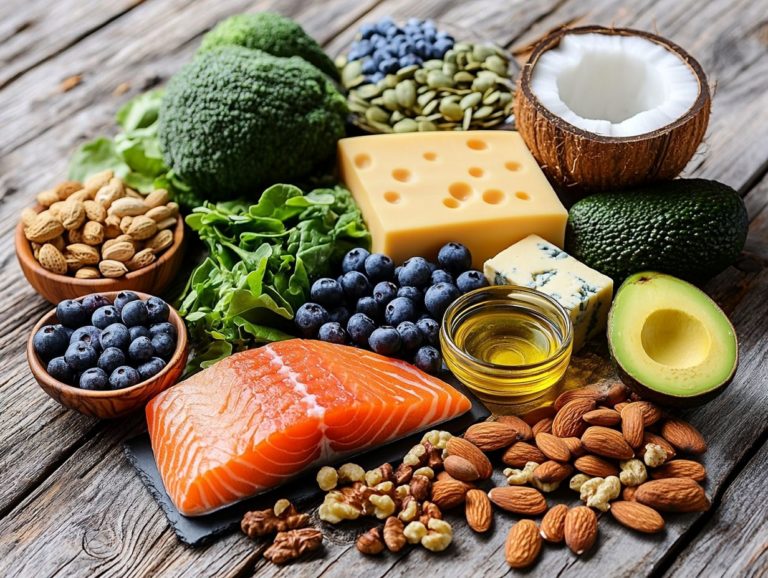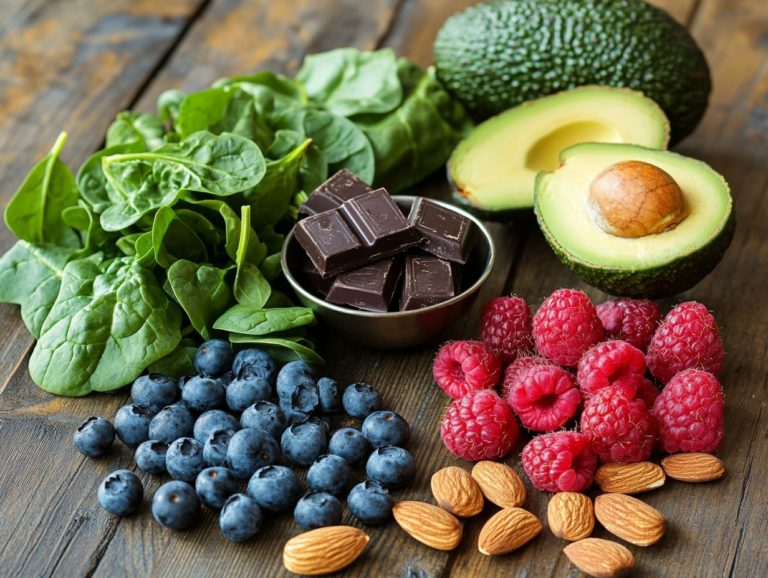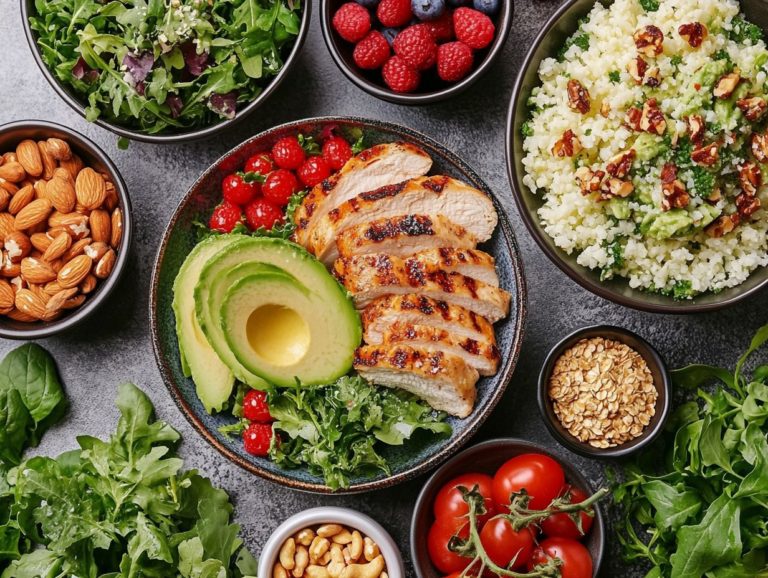Keto Diet: A Complete Nutritional Overview
Contents
- The Keto Diet: A Comprehensive Guide
- Understanding Nutrient Deficiencies and Challenges of the Keto Diet
- Getting Started with the Keto Diet
- Frequently Asked Questions
- What is a Keto Diet and how does it work?
- What are the main benefits of following a Keto Diet?
- Is the Keto Diet suitable for everyone? (Type 2 Diabetes)
- What are some common foods to include in a Keto Diet?
- Are there any potential side effects of following a Keto Diet?
- Can the Keto Diet be maintained long-term?
The Keto Diet: A Comprehensive Guide
The Keto diet has surged in popularity as a powerful method to help with weight loss and increased energy levels. By significantly cutting down on carbohydrates and embracing healthy fats, you can transition your body into a state called ketosis, where it efficiently burns fat for energy fuel.
This article delves into the essence of the Keto diet, highlighting the foods you can relish, those you should steer clear of, as well as its potential benefits and risks. You ll also discover practical tips to embark on this transformative journey, including preparing a comprehensive keto shopping list and understanding the required macronutrients.
Whether you re just starting out or aiming to refine your Keto strategy, you ll find valuable insights to support you every step of the way on your Keto adventure, including navigating potential keto symptoms like the keto flu.
Key Takeaways:
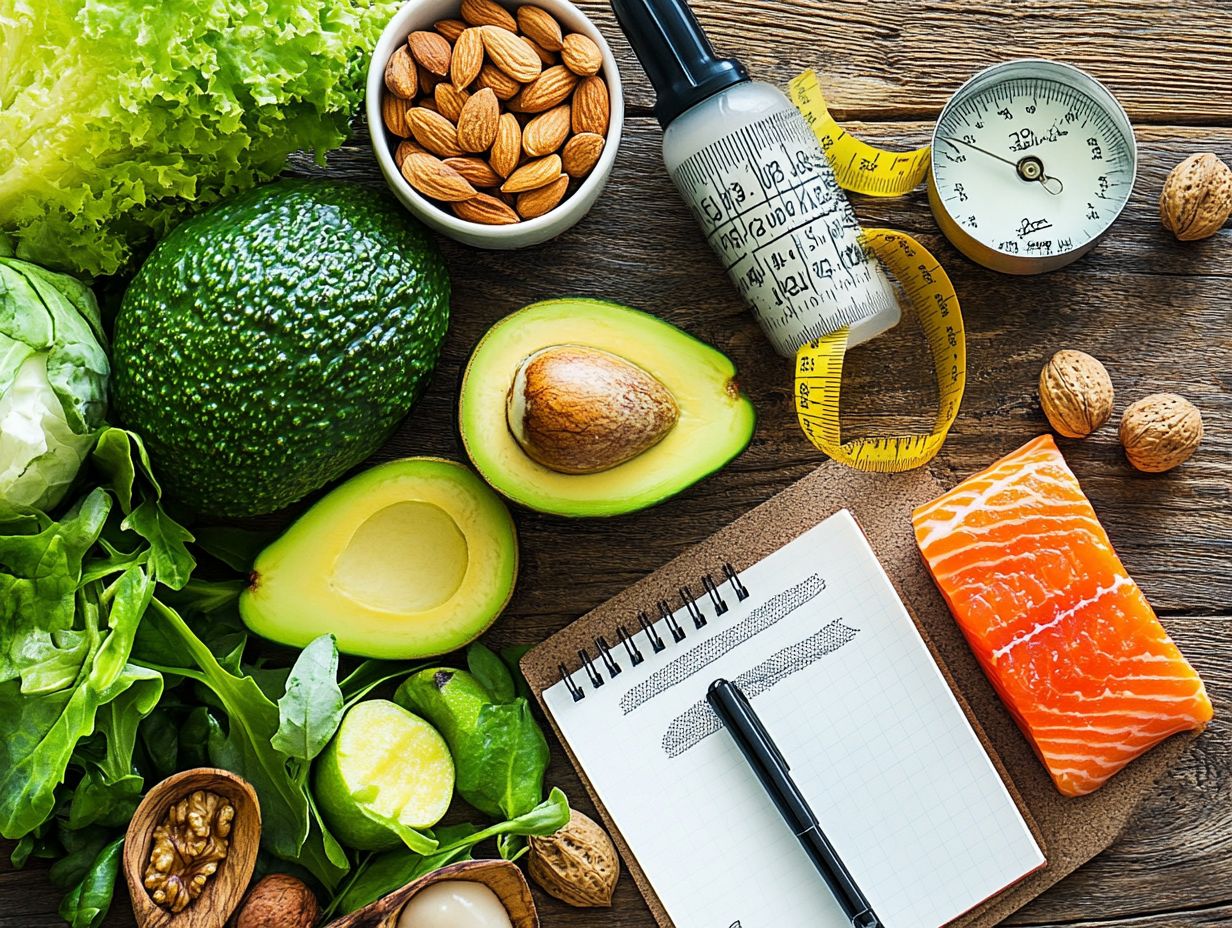
- The keto diet is a low-carb, high-fat, and moderate-protein eating plan that aims to put the body in a state of ketosis.
- Healthy fats, non-starchy vegetables, high-quality proteins, and some fruits and berries are key foods to include in a keto diet.
- High-carb foods, processed foods, and sugary drinks should be avoided on the keto diet to achieve the desired benefits.
- Understanding your protein intake and carbohydrate intake is crucial to maintaining ketosis and achieving the benefits of the ketogenic diet.
What is the Keto Diet?
The keto diet, often referred to as the ketogenic diet, is a sophisticated high-fat, low-carb approach carefully crafted to help with weight loss while offering a host of health benefits. This nutritional strategy encourages your body to enter a metabolic state known as ketosis, where it shifts to burning fat for energy instead of carbohydrates.
As a result, you may see a reduction in body fat and an improvement in insulin sensitivity. Many people are excited to embrace this lifestyle for its promising advantages in managing Type 2 Diabetes and enhancing overall health, often with guidance from healthcare professionals and registered dietitians like Marie Spano, RD, and Dr. Mohr.
What Foods Can You Eat on the Keto Diet?
On the keto diet, you can savor a diverse array of foods, focusing on high-fat, low-carb options. This encourages you to indulge in healthy fats like creamy avocado and rich olive oil. You can also easily add non-starchy vegetables such as fresh spinach and vibrant broccoli to meet your vegetable intake.
These choices are essential for fulfilling your nutritional requirements while remaining in ketosis. You can also easily add lean proteins and dairy products like calcium and vitamin D into your meal plans, ensuring you obtain a wealth of essential nutrients without the burden of high-carbohydrate alternatives.
1. Healthy Fats
Healthy fats are a cornerstone of your keto journey, serving as essential energy sources. Foods like avocados and olive oil support fat metabolism and help you feel full.
In fact, adding sources such as fatty fish, coconut oil, and full-fat dairy can elevate your dietary experience even further. These fats provide sustained energy throughout the day and help keep hunger at bay, allowing you to adhere comfortably to your meal plans and avoid nutrient deficiencies.
Regarding portions, think moderation: a handful of nuts or a couple of tablespoons of olive oil can be just right. By weaving a variety of these healthy fats into your meals, you may find improved mental clarity and stable energy levels, making it easier to maintain an active lifestyle while enjoying the benefits of the keto diet, including potential weight loss.
Are you ready to transform your health? Start your keto adventure today!
2. Non-Starchy Vegetables
Non-starchy vegetables play a crucial role in your keto diet, supplying essential nutrients and fiber without sending your carbohydrate intake into overdrive. Vegetables like spinach, kale, and zucchini not only enhance your overall health but also keep you in ketosis while adding much-needed bulk and variety to your meals. This is key for managing your vegetable intake effectively.
These vegetables are loaded with vitamins A, C, and K, along with important minerals such as potassium and magnesium. All of these are vital for your body’s optimal functions, especially when you’re navigating the strict carbohydrate limits of this diet. Their high fiber content aids digestion and helps you feel full, making them a superb choice for meeting your nutritional needs.
Incorporating non-starchy vegetables into your meals can be effortlessly simple, such as:
- Tossing a handful of greens into your morning smoothie
- Roasting zucchini to serve as a delightful side dish
- Blending broccoli into a creamy, comforting soup
By experimenting with various cooking techniques and seasonings, you can transform these nutrient-packed vegetables into enjoyable and satisfying staples in your everyday meals.
3. High-Quality Proteins
High-quality proteins are critical for you if you want to maintain muscle mass and support your overall health while following the keto diet. Sources like chicken, fish, and eggs not only meet your protein needs but also align perfectly with the diet s low-carb requirements, promoting muscle preservation and delivering a host of health benefits, including better athletic performance.
Incorporating lean meats like turkey and plant-based proteins such as tofu adds diversity to your diet and enhances nutrient intake. The role of protein goes beyond just muscle maintenance; it s also essential for synthesizing enzymes and hormones that are crucial for your metabolic health.
Balancing your protein intake is vital. Consuming too much can inadvertently lead you to increase your carbohydrate consumption, which could compromise the principles of keto. It s important to carefully consider portion sizes to meet your protein needs while keeping carbs in check.
Thoughtful meal planning can help you strike this balance, allowing you to enjoy a sustainable array of food choices that support both your health and fitness goals. This is where meal prep becomes particularly useful.
4. Some Fruits and Berries
While the keto diet may have you avoiding high-sugar fruits, you ll be pleased to know that certain fruits and berries can still find a place in your meal plan just in moderation, of course. Think raspberries, strawberries, and blackberries. These low-carb gems not only offer a burst of flavor but also pack in essential nutrients and antioxidants, allowing you to keep your carbohydrate intake within recommended limits and enjoy the diverse food choices available on keto.
Incorporating these low-carb fruits into your diet can be both satisfying and nutritious. For example, raspberries, rich in fiber, can be your ally in promoting digestive health, while strawberries serve up vitamin C and manganese, both vital for immune function. Consuming these fruits can also aid in managing potential digestive issues on the keto diet.
Remember, portion control is key. Enjoying a small bowl of berries as a snack or tossing them into smoothies or salads can elevate your meals without pushing your daily carb limits. You can even get creative by using these fruits in keto dessert recipes or as delightful toppings for chia pudding, transforming healthy eating into a pleasurable experience.
By being mindful of your daily carb allowances, you can truly savor these delicious options while staying aligned with your ketogenic goals. Including them in your keto shopping list can help you better plan your meals.
What Foods Should You Avoid on the Keto Diet?
To truly thrive on the keto diet, it’s essential for you to steer clear of high-carb foods that can throw you out of ketosis. This includes processed foods and sugary beverages, which can cause unwanted spikes in your blood glucose and insulin levels. This is crucial for effective diabetes management and maintaining heart health.
Such dietary missteps can significantly impede your weight loss journey and diminish the health benefits that come with embracing the ketogenic lifestyle.
Start planning your meals today to avoid these high-carb pitfalls!
1. High-Carb Foods

High-carb foods can be very challenging for anyone navigating the keto diet, as they can greatly disrupt your body s ability to maintain ketosis. You ll want to steer clear of common culprits like bread, pasta, rice, and starchy vegetables. These foods can interfere with your weight loss and overall health objectives, leading to weight cycling and undermining your efforts.
Sugary snacks and beverages, beans, and most fruits are also loaded with carbohydrates that can impede your progress. These items can rapidly spike your blood sugar, sabotaging your progress and sparking cravings, making it tough to stay dedicated to your dietary plan.
To conquer these hurdles, consider embracing low-carb alternatives such as:
- cauliflower rice
- zucchini noodles
- leafy greens
These substitutions offer satisfying texture and flavor while keeping your carbohydrate intake in check. This allows you to remain in ketosis and effectively support your weight loss journey.
2. Processed Foods
Processed foods can pose significant health risks while navigating the keto diet. These items often contain hidden sugars and unhealthy fats that can easily spike your carbohydrate intake. Such foods can undermine your carefully crafted dietary habits, making it challenging to achieve your nutritional goals and maintain ketosis.
Relying on these foods can increase the risk of adverse effects and nutrient deficiencies. As you strive for optimal health, be cautious about incorporating pre-packaged snacks, sugary beverages, and instant meals into your routine.
These convenient options are typically brimming with additives and preservatives, which not only divert you from the core principles of the diet but also jeopardize your metabolic health and increase the risk of cardiovascular disease.
Instead of reaching for those tempting yet detrimental choices, consider opting for fresh vegetables, organic meats, and healthy fats like avocados and olive oil. These whole food alternatives support your journey into ketosis and deliver essential nutrients, fostering a more balanced and sustainable approach to your health and well-being.
Incorporating a diverse food list can help you get the most out of your diet.
Epilepsy Foundation
The Epilepsy Foundation supports the use of the keto diet for managing epilepsy, offering resources and guidance.
3. Sugary Drinks
Incorporating ketogenic foods can help reduce cravings for sugary drinks, promoting better overall health. On the keto diet, it s essential to steer clear of sugary drinks think soda, fruit juices, and sweetened teas. Their high carbohydrate content can severely hinder your weight loss efforts.
These beverages have a sneaky way of spiking your blood sugar levels, complicating your ability to maintain your desired carb intake. Just one sugary drink could take up a large chunk of your daily carb allowance while following the keto lifestyle.
This blood sugar spike disrupts ketosis and triggers cravings, making it increasingly difficult to resist other tempting high-carb foods. Moreover, sugary drinks are nothing but empty calories, devoid of nutritional benefits, which can negatively impact your overall health.
To truly support your weight loss journey while adhering to a ketogenic diet, consider switching to alternatives like water, herbal teas, or unsweetened beverages. Make the switch today! These options will keep you hydrated and align seamlessly with your dietary goals, helping you stay focused on your path to success.
Remember, energy intake should be carefully monitored to maximize keto benefits.
What Are the Benefits of the Keto Diet?
The keto diet presents a wealth of advantages, especially regarding weight loss, better blood sugar regulation, and heightened energy levels, which keeps you energized throughout the day. As noted by health experts such as Marie Spano, RD, Atlanta, the keto diet can also support improved sports nutrition.
By transitioning your body into a state of ketosis, a state where your body burns fat for energy instead of carbohydrates, you might see impressive drops in body fat and improved cognitive function. Enhanced mental clarity makes this dietary approach an enticing option for many individuals seeking transformative health benefits.
Experts like Dr. Mohr have highlighted these keto benefits as key reasons for its growing popularity.
In summary, the keto diet presents numerous benefits that can enhance your health and well-being. By avoiding high-carb and processed foods, and choosing healthier options, you can achieve your nutritional goals and enjoy the advantages of keto diet nutritional science. Take action today and start your journey towards better health!
1. Weight Loss
One of the standout benefits of the keto diet is its remarkable effectiveness for weight loss, largely because it promotes eating fewer calories and encourages fat burning. Reducing carbohydrate intake prompts your body to use stored fat for energy, resulting in a reduction in your overall body fat percentage.
This metabolic state, known as ketosis, takes place when your liver converts fatty acids into ketones, providing a potent alternative energy source that speeds up fat metabolism. As your body adjusts to this new energy source, you ll likely notice a decrease in appetite and cravings, allowing you to maintain a caloric deficit without the usual struggle of traditional dieting.
To truly maximize your weight loss results, focus on incorporating high-quality fats, moderate protein, and staying hydrated. Make regular physical activity a part of your routine. By understanding portion sizes and meal timing, you can further enhance the effectiveness of the ketogenic approach, paving a sustainable path toward achieving your personal weight loss goals. Keto cycling may help some individuals maintain long-term adherence and health benefits.
2. Improved Blood Sugar Control
The keto diet is renowned for its remarkable ability to enhance blood sugar control, making it an advantageous dietary strategy for those grappling with insulin sensitivity and Type 2 diabetes. By cutting down on carbohydrate intake, you may find that your blood glucose levels decrease, leading to better management of your diabetes. Notably, the diet s benefits for Type 2 diabetes have been endorsed by various health organizations.
This transformation occurs as your body enters a state where it begins to rely on fat as its primary energy source rather than glucose. As a result, your insulin sensitivity often improves, allowing for more effective regulation of blood sugar levels.
Research has shown that individuals following a ketogenic diet experience notable advancements in their glycemic control and fasting insulin levels, especially when compared to those adhering to higher-carbohydrate diets. Experts suggest that this dietary shift can facilitate significant weight loss, promoting metabolic health. It s crucial to choose the right keto snacks that support your overall dietary goals and metabolism.
Thus, embracing a keto diet may present a promising approach to managing diabetes for many individuals.
3. Increased Energy and Mental Clarity
Many individuals following the keto diet experience a remarkable boost in energy levels and enhanced mental clarity, thanks to the body s ability to utilize fat as its primary fuel source. This transition can lead to improved cognitive function, allowing for greater focus and productivity as you navigate through your day.
As your body shifts into ketosis, it becomes increasingly efficient at burning fat for energy, providing a stable fuel source that helps eliminate those annoying energy crashes often associated with high-carbohydrate diets.
Numerous studies and personal testimonials underscore how this dietary approach not only sharpens your focus but also cultivates heightened creativity and sustained motivation. Imagine feeling more focused at work without the afternoon slump! Participants in research trials have observed significant improvements in tasks requiring concentration and memory recall, suggesting that a well-formulated ketogenic diet could be your secret weapon for optimizing cognitive performance while maintaining steady energy throughout your daily activities.
4. Risks of the Keto Diet
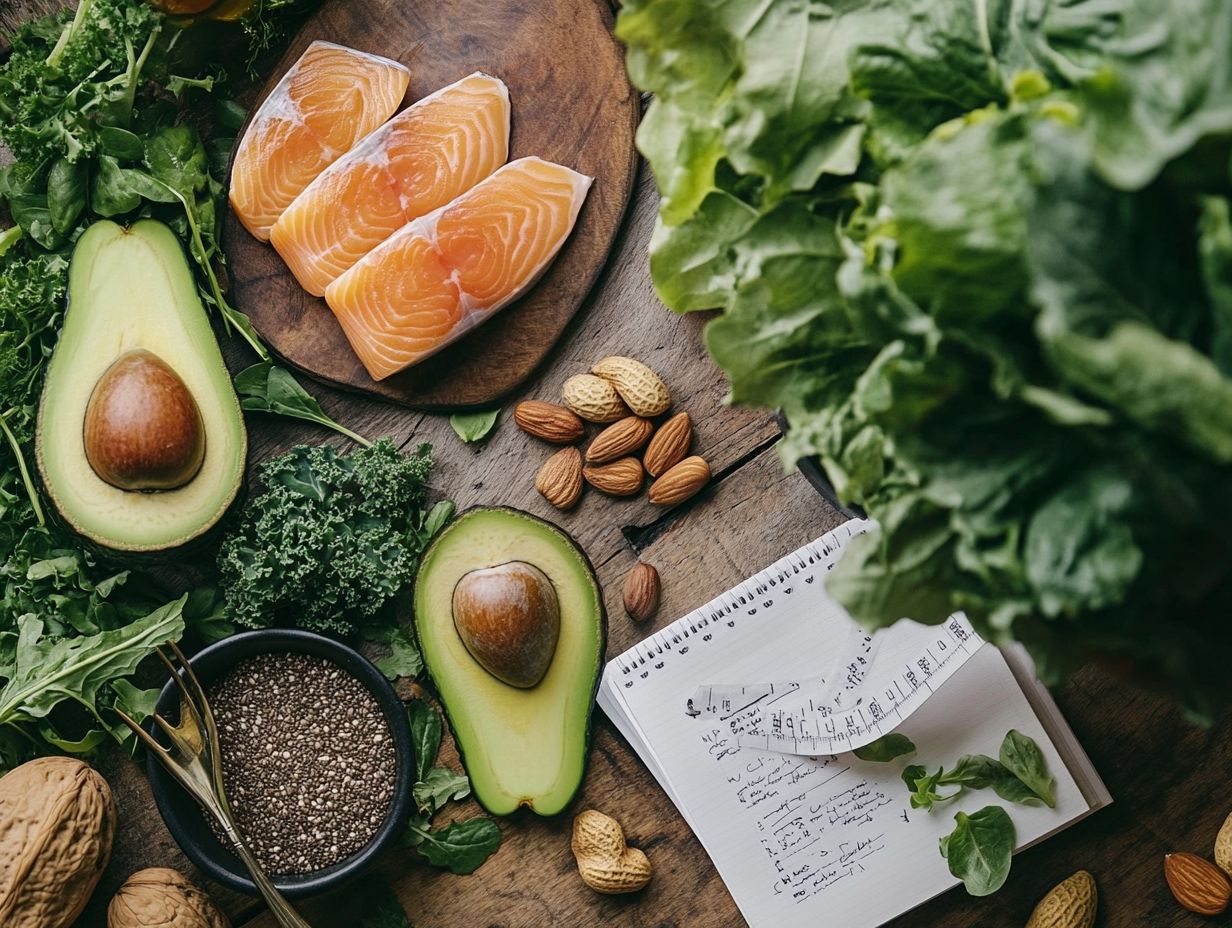
While the keto diet offers numerous advantages, it also comes with certain risks that you should be mindful of. These include potential nutrient deficiencies, the infamous keto flu, and other adverse effects stemming from significant changes in your eating habits.
It s crucial to approach this diet with careful consideration and reflect on how these altered dietary choices might impact your overall health.
Consider trying the keto diet today to unlock these potential benefits for your health!
Understanding Nutrient Deficiencies and Challenges of the Keto Diet
1. Nutrient Deficiencies
Nutrient deficiencies can creep in on the keto diet if you re not mindful about diversifying your food choices, especially when it comes to fruits, vegetables, and whole grains that are often limited.
This oversight can pave the way for potential health risks and leave you lacking essential vitamins and minerals crucial for your well-being. It s recommended to consult with healthcare providers, especially those experienced in sports nutrition, to ensure balanced nutrient intake.
The repercussions are not just physical. They can also drain your energy and vitality, which is why attentive dietary planning is paramount. Supplementing with vitamin D and folic acid can be particularly beneficial to prevent deficiencies. Don’t miss out on the benefits of proper supplementation consider incorporating these vitamins into your diet today!
As you embark on your keto journey, it s essential to keep a close eye on specific nutrients that might be in short supply. For instance, you may find that your intake of calcium and vitamin D dips due to the cutback on dairy products, often labeled as high-carb.
To counter this, consider integrating leafy green vegetables, nuts, and fortified foods into your meals. Additionally, explore vitamin D supplements, especially during those dreary winter months. Experts from California recommend that proper supplementation can significantly support your body s metabolism and nutrient balance.
Magnesium, which is vital for muscle function and metabolism, often falls short in a keto diet. By incorporating seeds, nuts, and leafy greens, you can bolster your intake. Furthermore, folic acid, crucial for cell division, might be lacking without certain food groups. Planning meals rich in avocados and leafy greens is a wise move to maintain balanced levels.
When necessary, supplementation can serve as a beneficial strategy to fill in the gaps. Consulting with professionals in health claims and nutrition can provide additional support and guidance.
2. Keto Flu
The keto flu is a common set of symptoms you may encounter during the early stages of adopting the keto diet. You might find yourself grappling with fatigue, headaches, and irritability. These symptoms arise as your body adjusts to a new dietary lifestyle and starts the transition into ketosis.
As your body begins depleting its glycogen stores (the body s stored form of glucose) and shifts to burning fat for fuel, various discomforts can emerge, leaving you feeling a bit out of sorts. While the duration of the keto flu can vary, it typically lasts anywhere from a few days to about a week.
To help your body adapt, focus on staying hydrated, since dehydration can amplify your symptoms. Supplementing with electrolytes like sodium, potassium, and magnesium is essential for maintaining balance and minimizing cramps.
Furthermore, ensure a gradual reduction in carbohydrate intake instead of making an abrupt cut. This will help your body adapt more smoothly to the ketogenic lifestyle.
3. Potential for Disordered Eating
The restrictive nature of the keto diet can pave the way for disordered eating behaviors, as you might find yourself developing an unhealthy relationship with food or experiencing anxiety around carbohydrate consumption. It s vital to keep a close eye on your dietary habits to mitigate these potential health risks.
Understanding various food groups and their nutritional benefits can help maintain a balanced approach. You may begin to tie your self-worth to strict adherence to the diet, which can lead to guilt or shame whenever you stray even slightly from your meal plan.
This mental burden often fosters an all-or-nothing mindset, making it difficult to savor meals, enjoy social gatherings, or indulge in an occasional treat. Support from nutrition experts like those in Atlanta can provide valuable insights to maintain balanced eating habits.
To navigate a ketogenic lifestyle in a healthier manner, it s essential to embrace mindfulness in your food choices, prioritizing balance and flexibility over rigid rules. By permitting yourself some occasional indulgences, you can sustain your physical health while also nurturing your psychological well-being, ultimately fostering a more positive and sustainable approach to dieting.
Getting Started with the Keto Diet
Ready to dive into the keto diet? Here s how to kickstart your journey! Getting started entails several essential steps that set the foundation for your success. Begin by calculating your macros, as this will help you understand the ideal ratios of fats, proteins, and carbohydrates for your body. Consulting with experts like Marie Spano, RD, can provide additional personalized guidance.
Thoughtful meal planning is crucial, ensuring that you have satisfying and compliant options readily available. Don t underestimate the importance of staying hydrated, as proper hydration supports overall health and well-being. Keeping track of your progress can provide valuable insights into your journey.
Many individuals find it beneficial to consult with a registered dietitian, who can help you customize your approach and adhere to the diet s fundamental principles effectively.
1. Calculate Your Macros
Calculating your macros is crucial for achieving success on the keto diet. This allows you to customize your macronutrient intake to feature a higher proportion of fats. You’ll need to keep carbohydrates and proteins in check. This level of precision ensures that your energy intake aligns perfectly with your goal of entering and maintaining ketosis.
To accurately determine these ratios, you can take advantage of various online calculators that estimate your daily caloric needs based on factors such as age, weight, height, and activity level. Expert advice from professionals like Dr. Mohr can further refine your approach.
Typically, most of your daily calories should come from fats: about 70-75% fats, 20-25% protein, and a modest 5-10% carbohydrates. However, feel free to personalize these values; for example, if you re an athlete, you might need to increase your protein intake.
You should consider tracking your food consumption using apps that log macronutrients. This will help you stay within your set limits. As you progress, fine-tuning your intake can optimize your weight loss or muscle gain, depending on your specific health goals. Ensuring adequate intake of essential nutrients, such as vitamin D, can also support your overall health.
2. Plan Your Meals (Epilepsy Foundation)
Meal planning is an essential strategy for anyone embarking on the keto diet, giving you the power to make informed food choices while ensuring access to keto-compatible meals and snacks all week long. By preparing your meals in advance, you ll find that adhering to the diet becomes not only easier but also more sustainable.
This proactive approach significantly reduces the temptation to veer off course from your dietary goals. It saves you precious time and alleviates stress during those hectic weekdays. Devote a few hours each week to organize your meals, concentrating on low-carb ingredients that are rich in healthy fats and proteins.
Incorporating a variety of keto-friendly snacks into your plan think cheese crisps, nuts, or veggie sticks paired with guacamole will help keep those cravings at bay without straying from your dietary guidelines. Preparing versatile dishes, such as cauliflower rice or zucchini noodles, allows you to create multiple meals with ease, providing both convenience and satisfaction on your keto journey.
3. Stay Hydrated
Staying hydrated is crucial on the keto diet. Your body often needs extra fluids to adapt to new dietary habits and support metabolic processes. Proper hydration not only boosts your overall health but can also help ease some of the symptoms associated with the keto flu during those initial transition days.
When you don’t drink enough water, you might find yourself battling fatigue, headaches, and irritability symptoms that can be especially unsettling during the adaptation phase of the diet. It’s generally recommended that you aim for at least 2 to 3 liters of water per day, adjusting based on your activity levels and personal needs.
Incorporating electrolytes like sodium, potassium, and magnesium can take your hydration game to the next level. This is particularly important as your body releases excess water due to reduced carbohydrate intake. This balance is essential, not just for maintaining your energy levels but also for ensuring that your vital bodily functions remain in top shape throughout this dietary transformation.
4. How to Monitor Your Progress
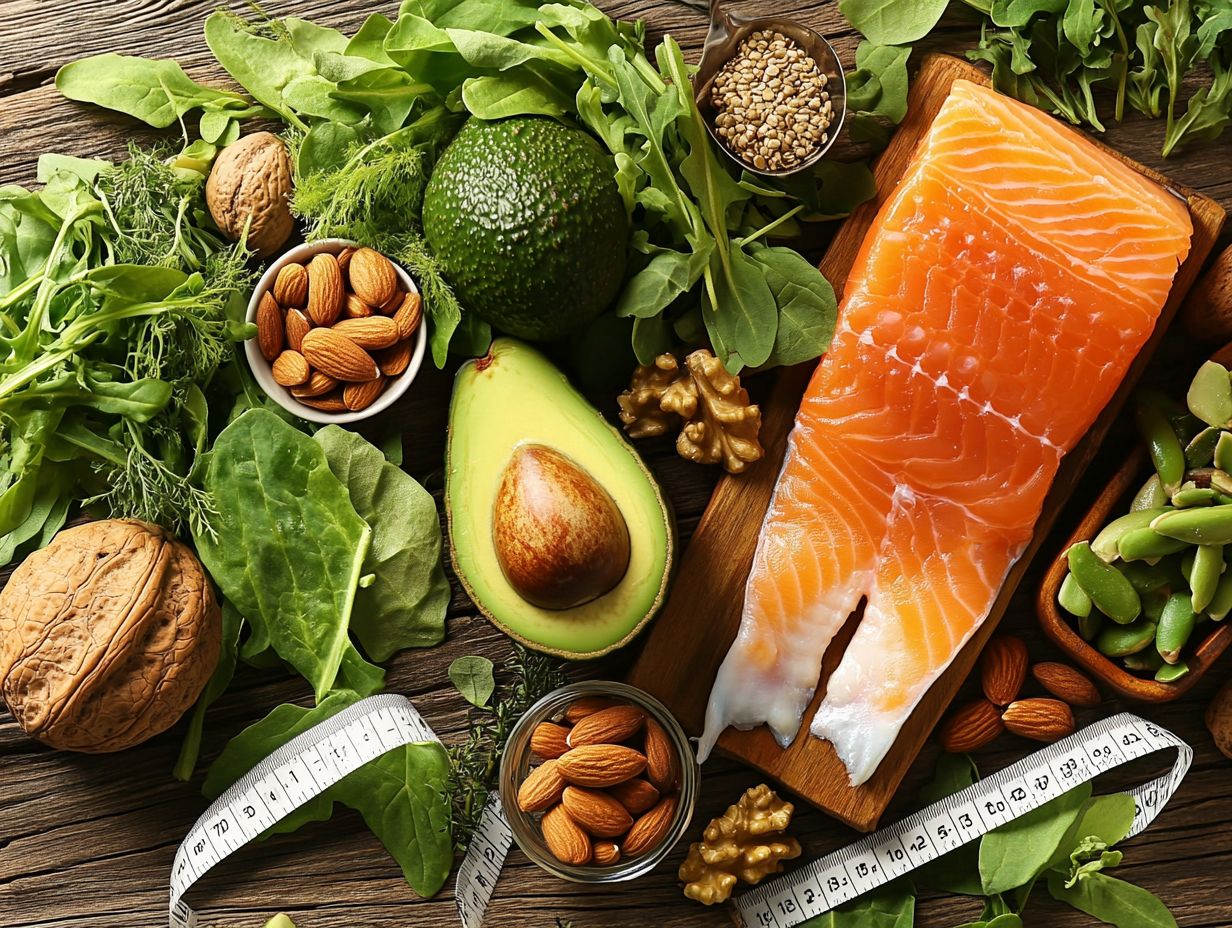
Monitoring progress is essential for the keto diet. It enables you to track weight loss and assess health benefits over time. By regularly checking your dietary goals and observing physical changes, you can maintain motivation and adherence to this lifestyle.
Incorporating practical methods like weekly weigh-ins and monthly body measurements will help you understand how your body responds to this low-carb journey. Keeping a journal to track your energy levels and mental clarity can provide valuable insights into your overall well-being.
Celebrate your milestones, whether significant weight loss, improved stamina, or enhanced focus, while allowing for flexibility in your approach. If progress stalls or your energy dips, it may be time to reassess your methods to ensure they align with your personal health goals.
For those in specific regions like Atlanta, California, and beyond, local keto communities can offer additional support.
Frequently Asked Questions
Here are some commonly asked questions about the Keto diet.
What is a Keto Diet and how does it work?
A Keto Diet is a low-carb, high-fat diet that forces the body to burn fat for energy instead of carbs. By limiting carbohydrate intake, your body enters a state called ketosis, where it produces ketones used as fuel instead of glucose.
What are the main benefits of following a Keto Diet?
- Weight loss
- Improved blood sugar control
- Increased energy levels
- Reduced inflammation in the body
Is the Keto Diet suitable for everyone? (Type 2 Diabetes)
Some people, especially those with certain medical conditions, should be cautious when considering the Keto diet. It may not be suitable for those with Type 2 Diabetes or for pregnant or breastfeeding women.
What are some common foods to include in a Keto Diet?
- Meats
- Fish
- Eggs
- Non-starchy vegetables
- Healthy fats such as avocado and olive oil
- Small amounts of low-carb fruits and dairy products
Processed and high-carb foods should be avoided.
Are there any potential side effects of following a Keto Diet?
Some potential side effects of a Keto Diet may include headaches, fatigue, and constipation. These are often temporary and can be managed by staying hydrated and gradually easing into the diet. It is important to consult with a healthcare professional before starting any new diet.
Can the Keto Diet be maintained long-term?
The Keto Diet can be maintained long-term as a lifestyle change, but it requires careful planning and monitoring to meet all nutritional needs. It is essential to have a well-rounded and balanced diet while listening to your body’s needs.
Start monitoring your progress today to stay motivated!

